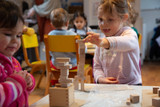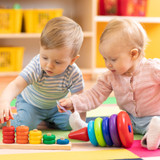Pink Shirt Day 2023: Can toddlers be bullies?
Picture this scene. Two toddlers are sitting next to one another, and each one is playing with a toy. Toddler B decides they want Toddler A’s toy and snatches it from A’s hand. Toddler A bursts into tears while Toddler B starts to play with the “stolen” toy.
Is Toddler B a bully?
February 23rd is Pink Shirt Day and offers a great opportunity to talk about what bullying is and how parents and schools can deal with it. Since 2007, on the last Wednesday in February, Pink Shirt Day has aimed to create a kinder, more inclusive world. The day was inspired by an act of kindness in a small town in Nova Scotia when two Grade 12 students took a stand after a Grade 9 student was bullied for wearing a pink shirt to school. They went out and bought 50 pink shirts to hand out to their classmates. News got around, and in addition to those 50 shirts, hundreds more students showed up wearing pink. The bullying stopped. Since then, Pink Shirt Day has been celebrated in 180 countries.
But what about younger kids? Did you know that studies have shown that children in elementary and middle school are more likely to bully others than children in high school? This information comes from PREVNet.ca, a national research and knowledge hub that focuses on fostering healthy relationships among children and youth.
Another study indicated that 20.4% of kids between the ages of 2 and 5 years old had experienced physical bullying, while 14.6% had been verbally bullied. Other research has shown that children aged 4-6 are most likely to behave like bullies.
Until about age 3, children operate almost entirely on impulse and haven’t yet learned the concept of empathy: the ability to feel another person’s emotions, to put themselves in someone else’s shoes to understand what they’re feeling and to want to help someone in distress. As well, young children may not have the vocabulary skills to express their emotions, so they resort to responding physically to express themselves.
By the time they pass their third birthday, toddlers should start to understand that their actions affect others. It's around this age that bullying behaviours could become a problem, as children notice how others (kids AND adults) act and copy those actions.
Bullying may be verbal, physical, or social. Verbal bullying includes name-calling or putdowns. Physical bullying involves pushing, kicking or punching. Social bullying may take the form of exclusion or rejection. Some kids engage in bullying to get attention, while others find it funny to get a reaction out of the victim. Sometimes, a child may have been bullied themselves, so they go along with their bully to avoid being targeted again.
So when is behaviour bullying and when can it be chalked up to toddlers being toddlers? In the case of Toddlers A and B above, here are some questions to consider in assessing B’s behaviour:
- is the behaviour intentionally aggressive?
- is the same behaviour repeated over time?
- is the child being secretive about the behaviour? Do they have things that don’t belong to them?
- does the child seem happy or unconcerned about the other person’s reaction to the situation?
What about Toddler A? How can you tell if a child is being bullied?
- they may be more anxious and/or moodier than normal
- they aren’t eating and sleeping well
- they no longer enjoy activities they normally love
- they try to avoid certain situations, for example, they may not want to go to school or play with certain children
As a parent or teacher, it’s vital to identify potential bullying behaviour early and address it sooner rather than later. To help you teach your children about the concepts of empathy and compassion, we suggest Leesa McGregor’s A New Alphabet For Humanity. Written for ages 3 years and up, this award-winning book introduces empowering words while creating excellent opportunities for parents and teachers to discuss these words, what they mean, and how they can impact people and the planet. It’s one of the most inspiring and uplifting books we’ve come across – you can read our full review here.
To find out more about us and our wide range of Montessori teaching materials and educational toys, contact us at 1-800-363-3013 or by clicking here.
LATEST BLOG POSTS
How To Set Up A Montessori Environment At Home
Creating a Montessori-inspired environment at home provides the opportunity to support your child's...
Montessori & Technology: do they play well together?
Dr. Maria Montessori’s method of teaching children emphasizes the use of concrete materials and hand...
Froebel Gifts: An Introduction
You may have heard of Fröebel Gifts (we carry the full selection here), but you may also wonder what...
Safe Toys for Toddlers: What Parents Should Know
As a parent, you want to be sure that any toys your toddler plays with are safe and age-appropriate....
Infant & Toddler Toy Guide - Part 2
THINKAMAJIGS’ GUIDE TO CHOOSING EDUCATIONAL TOYS FROM BIRTH TO AGE 3PART 2: AGE-RELATED DEVELOPMENTA...
Infant & Toddler Toy Guide - Part 1
THINKAMAJIGS’ GUIDE TO CHOOSING EDUCATIONAL TOYS FROM BIRTH TO AGE 3PART 1: SKILLS DEVELOPMENT“What...






